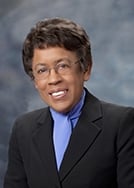You have /5 articles left.
Sign up for a free account or log in.

Constance Carroll
San Diego Community College District
SAN ANTONIO -- Community colleges are learning that getting the authorization to offer four-year degrees doesn't mean the struggle is over.
Twenty-two states allow community colleges to award bachelor's degrees, and many administrators believe that number will grow. During the 2015 American Association of Community Colleges annual meeting here, many of those administrators said they are working to convince the public and their counterparts in the four-year community of the benefits of offering a four-year program -- and that they continue to face limits and opposition.
Florida has allowed community colleges to confer four-year degrees for years, yet last year the colleges received a new hurdle when the state Legislature placed a moratorium on new four-year programs. Meanwhile, California's pilot program -- viewed as a breakthrough for the movement -- is limited to 15 colleges that may offer at most one bachelor's degree program each and may not offer degrees offered by any public university.
California authorities approved four-year programs at community colleges in dental hygiene, biomanufacturing and health information management, but nursing was excluded because that would have duplicated public university programs.
By 2020 the state will have a critical shortage of nurses, said Constance Carroll, chancellor of San Diego Community College District, because hospitals will be required to have 80 percent of the nursing staff holding bachelor's degrees. In 2014, the state's Board of Registered Nurses reported about 60 percent of their workforce had obtained a bachelor's degree or higher.
To community colleges, the shortage is clear evidence that they should be able to offer programs in nursing. (Critics fear a shortage of money to fund the new programs, and the possibility of mission creep at two-year institutions.)
"This turf war and emotionalism of it all is so great that people haven't focused on actual details and quantity issues," Carroll said.
"It will be a huge undertaking and the public universities don't have the capacity," said Linda Thor, chancellor of Foothill-De Anza Community College District.
Jackson Sasser, president of Santa Fe College, in Florida, said of the moratorium in Florida that the "resistance hasn't just come from the public universities."
Rather, he said, "It's the for-profits and private colleges and universities opposing this because they see us as competition. Eight years ago they wouldn't offer these degrees, but now they're in opposition to us."
Sasser said he's optimistic the moratorium will be lifted soon.
Thor said she believes it will take an educational campaign for colleagues in the field to understand the market needs for these programs and how the community colleges' bachelor's degrees will help.
When Californians see that they can achieve a $10,000 degree in a high-demand field, they will be demanding we offer these programs, she said.




